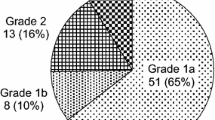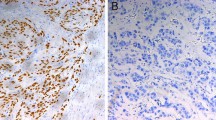Abstract
We reviewed molecular diagnosis and molecular treatment using p53 as a target for esophageal squamous cell carcinoma (SCC). First, we analyzed serum p53 antibodies (s-p53 Abs) in patients with esophageal SCC. Positive rate was 31% in all patients analyzed (n = 292) and 23% in stage I patients (cTNM/UICC stages) (n = 48). Presence of s-p53 Abs was significantly associated with p53 protein overexpression in resected tumor specimens. Seropositive patients were more likely to be resistant to chemoradiation and had a worse prognosis than seronegative patients. Second, we performed a clinical study of p53 gene therapy in 10 patients with unresectable chemoradiation-resistant esophageal SCC. In 9 patients, stability of the local tumor was achieved. No serious adverse events related to Ad5CMV-p53 have occurred in these patients, and the trial was safely conducted. Thus, intratumoral injection of Ad5CMV-p53 is safe, feasible, and biologically active when administered in multiple doses to patients with esophageal cancer. Observations from these clinical studies indicate that p53 is a useful molecular target in the diagnosis and treatment of esophageal SCC.
Similar content being viewed by others
References
Shimada H, Nakajima K, Ochiai T, Koide Y, Okazumi S, Matsubara H, et al. Detection of serum p53 antibodies in patients with esophageal squamous cell carcinoma: correlation with clinicopathologic features and tumor markers. Oncol Rep 1998;5:871–874.
Shimada H, Ochiai T, Nomura F; Japan p53 Antibody Research Group. Titration of serum p53 antibodies in 1,085 patients with various types of malignant tumors: a multi-institutional analysis by the Japan p53 Antibody Research Group. Cancer (Phila) 2003;1;97:682–689.
Shimada H, Takeda A, Arima M, Okazumi S, Matsubara H, Nabeya Y, et al. Serum p53 antibody is a useful tumor marker in superficial esophageal squamous cell carcinoma. Cancer (Phila) 2000;89:1677–1683.
Shimada H, Arima M, Nakajima K, Koide Y, Okazumi S, Matsubara H, et al. Detection of serum p53 antibodies in mucosal esophageal cancer and negative conversion after treatment. Am J Gastroenterol 1998;93:1388–1389.
Shimada H, Nabeya Y, Okazumi S, Matsubara H, Funami Y, Shiratori T, et al. Prognostic significance of serum p53 antibody in patients with esophageal squamous cell carcinoma. Surgery (St. Louis) 2002;132:41–47.
Shimada H, Kitabayashi H, Nabeya Y, Okazumi S, Matsubara H, Funami Y, et al. Treatment response and prognosis of patients after recurrence of esophageal cancer. Surgery (St. Louis) 2003;133:24–31.
Shimada H, Okazumi S, Takeda A, Nabeya Y, Matsubara H, Funami Y, et al. Presence of serum p53 antibodies is associated with decreased in vitro chemo-sensitivity in patients with esophageal cancer. Surg Today 2001;31:591–596.
Shimada H, Shimizu T, Ochiai T, Liu TL, Sashiyama H, Nakamura A, et al. Preclinical study of adenoviral p53 gene therapy for esophageal cancer. Surg Today 2001;31:597–604.
Shimada H, Matsubara H, Shiratori T, Shimizu T, Miyazaki S, Okazumi S, et al. Phase I/II adenoviral p53 gene therapy for chemoradiation resistant advanced esophageal squamous cell carcinoma. Cancer Sci 2006;97:554–561.
Oohira G, Yamada S, Ochiai T, Matsubara H, Okazumi S, Shimada H, et al. Growth suppression of esophageal squamous cell carcinoma induced by heavy carbon-ion beams combined with p53 gene transfer. Int J Oncol 2004;25:563–569.
Author information
Authors and Affiliations
Corresponding author
Additional information
Proceeding of a symposium at the 60th annual meeting of the Japan Esophageal Society: “Clinical aspects of molecular biology for the diagnosis and treatment of esophageal carcinoma.”
Rights and permissions
About this article
Cite this article
Shimada, H., Ochiai, T. Molecular diagnosis and treatment for esophageal carcinoma with p53. Esophagus 4, 165–168 (2007). https://doi.org/10.1007/s10388-007-0128-6
Received:
Published:
Issue Date:
DOI: https://doi.org/10.1007/s10388-007-0128-6




